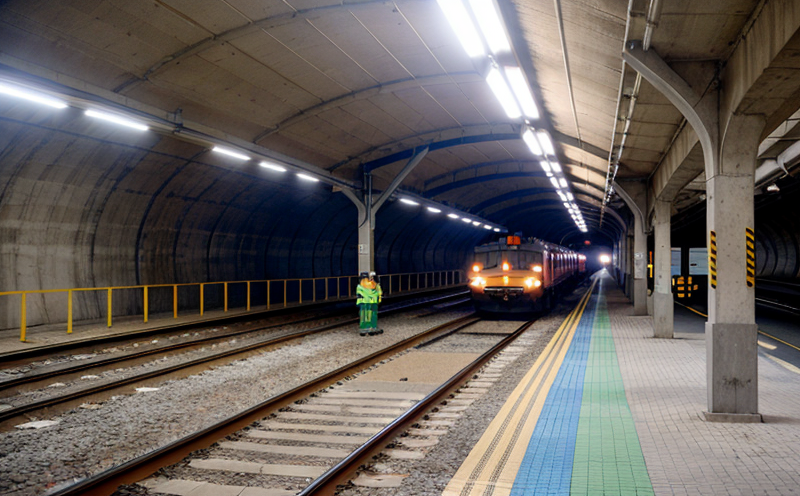EN 50125 Environmental Simulation Testing for Station Equipment
The European Standard EN 50125 defines environmental tests that ensure station equipment used in railway and transportation systems meets the required performance levels under various environmental conditions. This test is crucial for ensuring safety, reliability, and compliance with international standards.
Station equipment encompasses a wide range of devices including communication systems, power supplies, signal processing units, and other electronics that are integral to the operation of railway stations. The EN 50125 testing involves subjecting these devices to simulated environmental conditions that they may encounter during their operational lifecycle.
The standard aims to provide a harmonized approach across Europe for assessing the durability and robustness of station equipment against factors such as temperature extremes, humidity, dust, and other environmental stressors. Compliance with this standard is mandatory for manufacturers aiming to sell products within the European Union or comply with international agreements.
The testing process typically involves placing the equipment in a controlled environment that can replicate real-world conditions. This includes chambers capable of simulating high temperatures up to 85°C, low temperatures down to -40°C, humidity levels as high as 93% relative humidity, and exposure to salt spray for corrosion resistance.
Testing is not limited to just temperature and humidity; it also includes vibration testing to ensure that equipment can withstand the mechanical stresses of transportation. Vibration tests are conducted using shaker tables or similar devices that can simulate the dynamic forces experienced by station equipment during installation, operation, and maintenance.
In addition to physical stressors, EN 50125 also considers electromagnetic interference (EMI) and radio frequency interference (RFI). These tests are essential for ensuring that station equipment does not interfere with other electronic devices or be susceptible to external signals that could disrupt its functionality.
For quality managers and compliance officers, the importance of this testing cannot be overstated. It ensures that all equipment is fit for purpose, reducing the risk of malfunctions that could lead to safety hazards or operational disruptions. Compliance with EN 50125 also facilitates smoother international trade by ensuring compatibility across different regulatory environments.
R&D engineers play a critical role in this process as they design and develop new equipment that must meet these stringent standards. The testing not only validates the design but also provides insights into potential improvements or modifications needed for future iterations of products.
Why Choose This Test
- Ensures Compliance: Compliance with EN 50125 is a legal requirement in the European Union, ensuring that equipment meets all necessary safety and performance standards.
- Enhances Reliability: By simulating real-world conditions, this testing helps identify potential weaknesses before they lead to operational failures.
- Promotes Safety: Ensuring that station equipment can withstand environmental stresses minimizes the risk of accidents or disruptions in service.
- Facilitates International Trade: Compliance with this standard is recognized globally, making it easier for manufacturers to export their products internationally.
Customer Impact and Satisfaction
The implementation of EN 50125 testing has a direct impact on customer satisfaction by ensuring the reliability and safety of station equipment. Quality managers, compliance officers, and R&D engineers benefit from this as it reduces the risk of product recalls or service interruptions due to unforeseen failures.
Customers in the railway and transportation sectors can rest assured that products they purchase have undergone rigorous testing to meet international standards. This not only enhances trust but also ensures long-term viability and performance of equipment, leading to higher levels of customer satisfaction.
International Acceptance and Recognition
- European Union: EN 50125 is a mandatory standard within the European Union for railway station equipment, ensuring harmonization across member states.
- Beyond Europe: Many countries outside of Europe adopt this standard due to its robustness and reliability. It is often referenced in international agreements related to transportation infrastructure.
- Australia & New Zealand: While not directly part of the EU, these regions have also recognized EN 50125 for compliance purposes.





